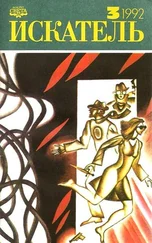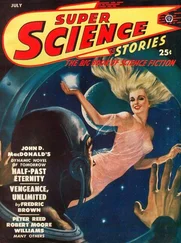Suddenly he had the feeling he was being trapped in some curious way, was being led from his assignment into a plan devised for some other reason, a plan wherein his role was minor; and looking at the panel above her resting hand, he saw what had probably given him subtle warning. There were brass buttons for the floors, pressed so many hundred thousand times the incised digits were almost worn away; yet when the gray light struck them properly, he could make out the topmost numeral of the vertical row — 21.
“So that’s it,” he said. “That’s what’s funny.” He made his mouth stretch wide in the knowing grin. The girl looked at him, startled and puzzled. “There’s no forty-second floor,” he said.
Frowning, she turned and looked at the row of buttons and then back at him. “You’re serious? Don’t you know about the annex at all? You know how the transients are. Top floor. Top floor. It’s all they can think about. But the people who stay have to have private lives, don’t they? Not all cluttered up with salesmen and people coming to town for the theater and all that. You’ve never been in the business, have you? All the city hotels are just the same, you know. The elevators for the transients go only so high, just to such and such a number, and the quiet floors, where people live, are above that, always, and they have their private ways to get up to them.”
She was so very patient that he felt ashamed of accusing her and felt irritated with himself for not having guessed, long ago, what she told him. There had always been enough clues. There were always people going through the hotel lobbies, looking neither to the right nor to the left, walking by the regular elevators to some special place and service awaiting them.
But when the elevator stopped and they got out, she reached back into it, pressed the lowest button, yanked her arm out quickly and slammed the latticework door. It began to creak downward, with a clicking of pulleys and rasp of cables. She looked up at him and wrinkled her nose in mischief and mockery, saying, “Don’t look so worried. There’ll be other ways down.” He remembered that she had not told him the joke, and he was once again annoyed at her.
These were broad corridors, pale gray, with composition floors, lighted by misted glass panels set into the ceiling. He tried to walk beside her, but she kept quickening her pace, and he realized she wanted him to walk behind her, a person guided rather than a companion. Many times they reached an intersection where the corridors stretched for vast distances, and sometimes she would pause to orient herself and then turn confidently right or left.
He noticed that all the numbers had been taken off the doors. He could see the raw holes where they had been screwed through gray paint into the plywood.
She was fifteen feet ahead of him, the dark hair bouncing at the nape of her neck to her swift, buoyant stride. The coarse gray fabric pulled in alternating diagonal tensions against her rear, and somehow he knew that were she quite still and quite bare, were he to place his hands so that his fingertips were hooked around the shelf of hip socket, feeling the warm, smooth slide of membrane over bone, holding her from the rear, his hands placed as a player holds a basketball for the long set shot, then through some delicious coincidence of design, the pads of his thumbs would fit precisely into the two deep dimples spaced below her spine. He shook himself out of the erotic musing, remembering how often they had told him that assignments were mishandled too often for exactly this reason.
At the end of a corridor, she pulled a heavy fire door open and turned to give him a bawdy wink, to run her tongue tip across her lips, as though she had read his mind and his weakness; and he determined not to look at her as she climbed the stairs ahead of him, and looked instead at the steel treads set into the concrete. He lost track of the number of flights they climbed. It winded him; and when he helped her push another fire door open, he tried to conceal his laboring lungs and to seem as fresh as she.
These corridors were a pale yellow, like weak winter sunlight, and at last they came to a small elevator standing open. The fluorescence inside was harsh and there was a sharp minty odor, as though it had recently been scrubbed with some cheap, strong antiseptic. It accelerated upward with a silent velocity that hollowed his belly and made his knees bend slightly. It opened automatically on a narrower, dingy, old-fashioned corridor. She reached into the elevator as before; and when the door hissed shut and she turned to speak, he said, “I know. There’ll be other ways down.”
“That isn’t what I was going to say.”
“I’m sorry. What were you going to say?”
“I can’t say it now. You spoiled it.”
Again he followed her. These corridors were set at odd angles. The room doors were shiny dark with old coats of varnish. The room numbers were not removed and they were of tarnished brass, fluted and curly and ornate. All the rooms were in the four thousand series, but they were not in any reasonable order, four thousand one hundred and something across from or next door to four thousand eight hundred and something.
She stopped very abruptly; and as he came upon her, he heard what she had heard — the gritty sound of latch and bolt — and then, twenty feet ahead of them, an old couple, dressed for winter, came out of one of the rooms, complaining at each other, fussing, asking if he or she had forgotten this or that, dropping small packages and picking them up.
Just before the old couple turned and noticed them, Mrs. Dorn hooked her arm around his waist and forced him into a slow walk. He put his arm, interlocked, around her, and she reached up with her free hand, placed it against his cheek, chuckled in a furry way, turned her mouth up to the awkward kiss while walking, so that as they passed the couple, he heard tsks and clucks of their disapproval. “Darling, darling,” she murmured. “Dave, darling.”
Behind them he heard the old man’s voice, without making out the words. There was a harsh resonance to it and then it cracked into a high quaver and then went deep again.
He smiled inside himself, thinking it sounded exactly like Ricky trying to manage his fourteen-year-old voice as it alternately squeaked and rumbled. The fingertips of the arm that was around her waist touched the top of the pocket on the left side of the gray shift, and with sneaky and daring inspiration, he slid his hand down into the pocket, bending his knees inconspicuously to lower himself just enough, the palm of his hand against round, warm thigh under fabric, and with his fingertips he touched the cylinder of yellow chalk and then the thin edge of metal. With the metal held against the nail of his index finger by the pad of his middle finger, he drew it out of the deep pocket and worked it into the palm of his hand.
She stopped and turned and leaned against the corridor wall and, with her hands resting lightly on his shoulders, looked up at him, still mocking him, saying, “You’re just not very bright, Dave, darling.”
The old people were gone, around a distant comer of the old hallway. Suddenly, he realized that she had cleverly kept them from seeing his face, so that they would be unable to identify him later. And with a sense of disbelief, he realized she had called him by his name.
“You could have told me how much you knew about this,” he said.
“It’s better for you to guess, dear. Look at what you took.”
He opened his palm and saw the miniature gold tag. Name, rank, serial number, blood type O, meaning zero, meaning blood type nothing. The shock was enormous. He was suddenly afraid he might cry like a child and shame himself in front of her. “How did you... How could Leo have...”
Читать дальше








![Джон Макдональд - Wine of the Dreamers [= Planet of the Dreamers]](/books/430039/dzhon-makdonald-wine-of-the-dreamers-planet-of-thumb.webp)
![Джон Макдональд - Finding Anne Farley [= Ring My Love with Diamonds]](/books/430180/dzhon-makdonald-finding-anne-farley-ring-my-lov-thumb.webp)
![Джон Макдональд - Area of Suspicion [= My Brother’s Widow]](/books/430260/dzhon-makdonald-area-of-suspicion-my-brother-s-thumb.webp)

